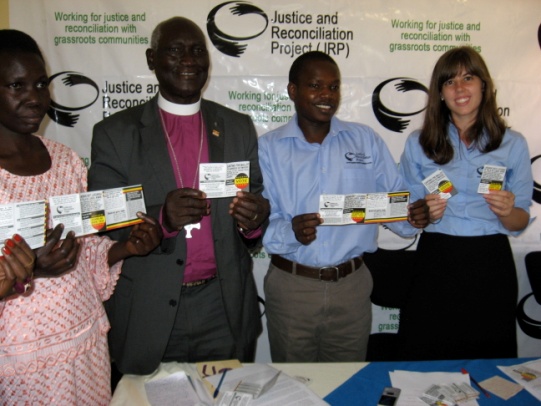FOR IMMEDIATE RELEASE
2016-06-02
Gulu, Uganda
‘Let’s Talk, Uganda’ gives space to community voices

Today the Justice and Reconciliation project and RNW Media are happy to announce the official launch of Let’s Talk, Uganda. The project wants to become a space for Ugandans to discuss issues close to their hearts and the hearts of their families.
We want to create and facilitate conversations about a wide variety of topics by combining the innovative use of new media with offline events. The online platforms will cover a wide range of topics relating to transitional justice, including international and national processes. Let’s Talk, Uganda aims to engage, inform and provide a safe space for respectful dialogue across Uganda.
Through a series of online platforms, including Facebook, Twitter and the Let’s Talk website, Ugandans will be able to access each other’s viewpoints and discuss your own thoughts in a safe space. In the coming months, the project will also visit several locations in northern Uganda, including Lira, Gulu, Lukodi and Odek, as well as Kampala to initiate discussions with local communities. The voices of grass-roots communities will be shared and discussed online, with that discussion feeding back into the community dialogues.
Providing a voice for marginalised communities is very important says Justin Ocan, a community member of Lukodi: “It will help people know what happened during the war,” he says, “The world will become aware of what should have been done.”
Oryem Nyeko, project team leader at the Justice and Reconciliation Project, believes the project will give a space for a more balanced narrative: “The narrative after war is usually shaped by one side, but we all know that history is more complicated. So it’s very important that all Ugandans have their opportunities to have their voices heard.”
Niklas Jakobsson, project coordinator for RNW Media, highlights the importance of respectful dialogue: “Let’s Talk, Uganda is not an information-sharing project. It’s a space for Ugandans to talk with each other, share experiences and find common ground.”
Tanja IJzer, senior program manager at RNW Media: “These issues are very close to the hearts of people in Uganda. Therefore we’re confident that these platforms will allow communities to amplify their voices across the country, creating greater understanding.”
Nancy Apiyo, project officer at JRP, believes this is a unique opportunity for communities: “For the first time the communities we’ve worked with will have their voices heard around the world through media and social media.”
The Justice and Reconciliation Project (JRP) in Gulu, Uganda, has played a key role in transitional justice (TJ) in Uganda since 2005 by seeking to understand and explain the interests, needs, concerns and views of communities affected by conflict.
RNW Media is a Dutch NGO media organisation that wants to achieve social change in communities. In parts of the world where change is difficult because freedom of speech is restricted, RNW uses media for social change, empowering young people to make informed choices through dialogue.
Contact information:
Niklas Jakobsson (RNW Media), Phone: +31 636 184 32, Email: Niklas.jakobsson@rnw.org
Oryem Nyeko (JRP), Phone: (256) 471 433 008 Email: onyeko@justiceandreconciliation.com
The website and social media platforms will be launched by the close of this week
Website: letstalk.ug
Facebook: fb.me/LetsTalkUganda
Twitter: twitter.com/talk_ug

 Today the Justice and Reconciliation Project (JRP), in partnership with the South Africa-based Institute for Justice and Reconciliation (IJR), commenced a series of grassroots consultations in northern Uganda to explore local perspectives on transitional justice.
Today the Justice and Reconciliation Project (JRP), in partnership with the South Africa-based Institute for Justice and Reconciliation (IJR), commenced a series of grassroots consultations in northern Uganda to explore local perspectives on transitional justice.
